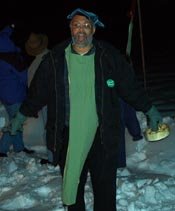United Methodist Bishops Back Complete Ban on Nuclear Weapons; Church Joins in Prayer for Victims of Hiroshima, Nagasaki Bombings
WASHINGTON – As the world marks the 60th anniversary of the atomic bombing of Hiroshima and Nagasaki, United Methodist bishops are urging governments to begin immediate negotiations for a complete ban on nuclear weapons.
“We are in prayer for the victims and survivors of the attack on Japan,” said Bishop Roy I. Sano, executive secretary of the council. “We are in prayer that peace will come to a troubled world where nuclear proliferation remains a constant and serious threat.”
The denomination’s bishops approved a resolution marking the early August anniversary of the bombings. In their resolution, the bishops noted that “many nations assume the United States’ nuclear arsenals are a real threat to world peace” because of the 1945 bombings in Japan.
This resolution is consistent with the Council of Bishops long-held position opposing nuclear proliferation, Sano said. In 1986, bishops authored a document In Defense of Creation: The Nuclear Crisis and a Just Peace that has served as a foundation for the denomination’s perspective on nuclear war.
The United Methodist Church has nearly 11 million members in the U.S., Africa, Europe, and Asia. The Council of Bishops consists of 69 active bishops and approximately 100 retired bishops around the globe.
The full text of the Council’s resolution follows:
60th Anniversary of Atomic Bombing
August 2005 marks the 60th anniversary of the atomic bombing of Hiroshima and Nagasaki. The Council of Bishops of the United Methodist Church joins in prayer for the victims and survivors of the first, and hopefully the last, nuclear warfare. We pray that peace may soon prevail in this broken world, and such weapons of mass annihilation may never be used again on any nation or on any people.
We believe that the spirit of the nuclear non-proliferation treaty is to reduce and eventually eliminate the possibility of a nuclear disaster. It means not only to stop the nations that do not currently have nuclear weapons from developing such weapons of mass destruction in the future, but also to reduce and eventually to eliminate all nuclear weapons, including the 10,000 possessed by the United States. We realize that one of the causes of the alleged violations of non-proliferation treaty is the fear of possible nuclear attack by nations considered a “threat to national security.” Since the United States is the only nation in the world that has ever used nuclear weapons on another nation, not only once, but twice, many nations naturally assume that the United States’ nuclear arsenals are a real threat to world peace. In addition, other nations continue the research and experimentation for the development of nuclear arms and weaponry. In the midst of the danger of this proliferation, we yearn for God’s shalom.
Therefore, we urge the governments of all nations developing or possessing nuclear weaponry to stop further development and to vow never again to use their nuclear arsenals as a way of solving international conflicts. We call upon these nations to begin immediate negotiations with the rest of the world toward a complete ban on nuclear weapons.
We also urge, on the occasion of the 60th anniversary of the nuclear attacks on Hiroshima and Nagasaki, the study and utilization of the Council of Bishops foundation document, “In Defense of Creation —The Nuclear Crisis and a Just Peace.”
Adopted May 2005
Tuesday, August 09, 2005
Subscribe to:
Post Comments (Atom)


No comments:
Post a Comment